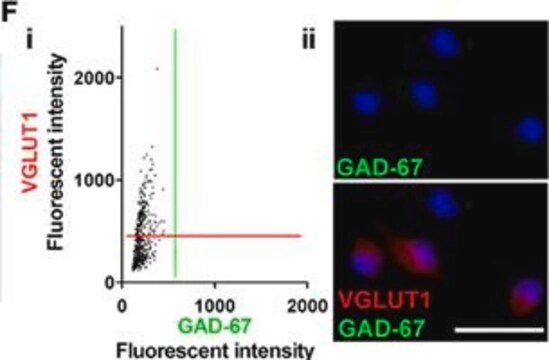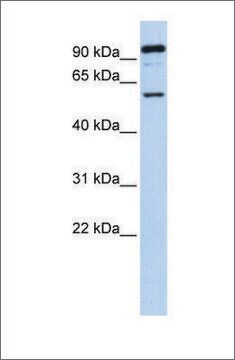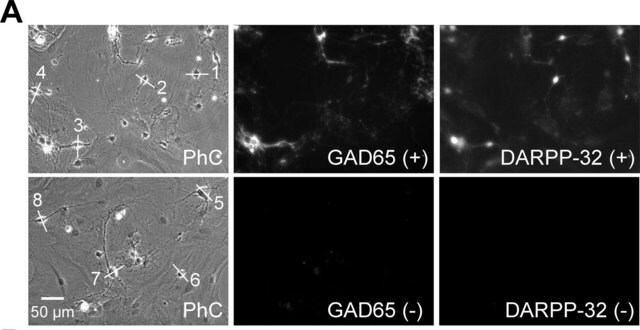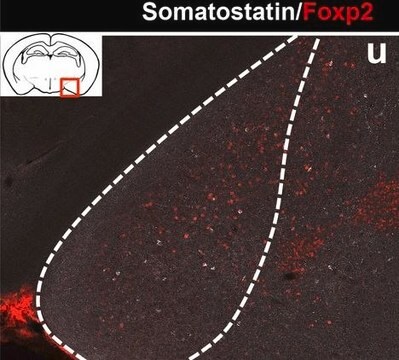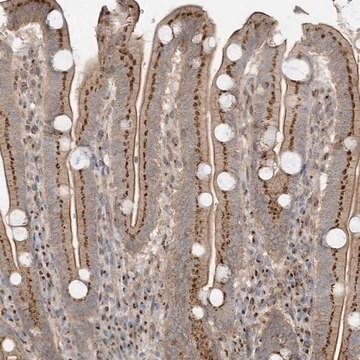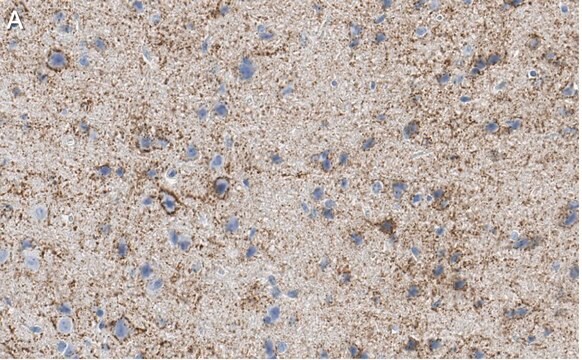Recommended Products
General description
FUNCTION: SwissProt: P14867 # GABA, the major inhibitory neurotransmitter in the vertebrate brain, mediates neuronal inhibition by binding to the GABA/benzodiazepine receptor and opening an integral chloride channel.
SIZE: 456 amino acids; 51802 Da
SUBUNIT: Binds UBQLN1 (By similarity). Generally pentameric. There are five types of GABA(A) receptor chains: alpha, beta, gamma, delta, and rho.
SUBCELLULAR LOCATION: Cell junction, synapse, postsynaptic cell membrane; Multi-pass membrane protein.
DISEASE: SwissProt: P14867 # Defects in GABRA1 are a cause of juvenile myoclonic epilepsy (JME) [MIM:606904]. JME is a common epileptic syndrome characterized by afebrile seizures, onset in adolescence (rather than in childhood) and myoclonic jerks. & Defects in GABRA1 are the cause of childhood absence epilepsy type 4 (ECA4) [MIM:611136]. ECA4 is a subtype of idiopathic generalized epilepsy (IGE) characterized by onset at age 6-7 years, frequent absence seizures (several per day) and bilateral, synchronous, symmetric 3-Hz spike waves on EEG. During adolescence, tonic-clonic and myoclonic seizures develop. Absence seizures may either remit or persist into adulthood.
SIMILARITY: SwissProt: P14867 ## Belongs to the ligand-gated ionic channel (TC 1.A.9) family.
SIZE: 456 amino acids; 51802 Da
SUBUNIT: Binds UBQLN1 (By similarity). Generally pentameric. There are five types of GABA(A) receptor chains: alpha, beta, gamma, delta, and rho.
SUBCELLULAR LOCATION: Cell junction, synapse, postsynaptic cell membrane; Multi-pass membrane protein.
DISEASE: SwissProt: P14867 # Defects in GABRA1 are a cause of juvenile myoclonic epilepsy (JME) [MIM:606904]. JME is a common epileptic syndrome characterized by afebrile seizures, onset in adolescence (rather than in childhood) and myoclonic jerks. & Defects in GABRA1 are the cause of childhood absence epilepsy type 4 (ECA4) [MIM:611136]. ECA4 is a subtype of idiopathic generalized epilepsy (IGE) characterized by onset at age 6-7 years, frequent absence seizures (several per day) and bilateral, synchronous, symmetric 3-Hz spike waves on EEG. During adolescence, tonic-clonic and myoclonic seizures develop. Absence seizures may either remit or persist into adulthood.
SIMILARITY: SwissProt: P14867 ## Belongs to the ligand-gated ionic channel (TC 1.A.9) family.
Peptide corresponding to amino acids 1-16 from mouse or rat GABA(A) alpha1 subunit (Swiss-Prot accession number P18504, residues 28-43 of the precursor).
Specificity
Recognizes GABA(A) alpha1. The epitope shares little sequence similiarity with alpha5 and alpha2 subunits (respectively, 9/16 and 8/16 residues identical). Does not share homology with any other known proteins.
SPECIES REACTIVITIES: It is expected that the antibody will also work on mouse. The epitope is highly conserved in human and bovine (16/17) and chicken (14/17). Other species have not been tested.
SPECIES REACTIVITIES: It is expected that the antibody will also work on mouse. The epitope is highly conserved in human and bovine (16/17) and chicken (14/17). Other species have not been tested.
Application
Western blot: 1.5 μg/mL (1:200) using ECL on rat brain membranes. Recognizes a 51kDa band.
Immunohistochemistry on rat brain: 4% PFA fixed sections, frozen 1:100-1:200 typical.
Dilutions should be made using a carrier protein such as BSA (1-3%)
Optimal working dilutions must be determined by the end user.
Immunohistochemistry on rat brain: 4% PFA fixed sections, frozen 1:100-1:200 typical.
Dilutions should be made using a carrier protein such as BSA (1-3%)
Optimal working dilutions must be determined by the end user.
Physical form
Affinity purified immunoglobulin. Lyophilized from phosphate buffered saline, pH 7.4, containing 1% BSA and 0.05% sodium azide as a preservative. Reconstitute with 200 μL of sterile deionized water. Centrifuge antibody preparation before use (10,000 xg for 5 min).
Storage and Stability
Maintain lyophilized material at -20°C for up to 12 months after date of receipt. After reconstitution maintain at -20°C in undiluted aliquots for up to 6 months. Avoid repeated freeze/thaw cycles.
Other Notes
CONTROL ANTIGEN: Included free of charge with the antibody is 40 μg of control antigen. The stock solution of the antigen can be made up using 100 μL of sterile deionized water. For negative control, preincubate 1 μg of peptide with 1 μg of antibody for one hour at room temperature. Optimal concentrations must be determined by the end user.
Disclaimer
Unless otherwise stated in our catalog or other company documentation accompanying the product(s), our products are intended for research use only and are not to be used for any other purpose, which includes but is not limited to, unauthorized commercial uses, in vitro diagnostic uses, ex vivo or in vivo therapeutic uses or any type of consumption or application to humans or animals.
Storage Class Code
10 - Combustible liquids
Certificates of Analysis (COA)
Search for Certificates of Analysis (COA) by entering the products Lot/Batch Number. Lot and Batch Numbers can be found on a product’s label following the words ‘Lot’ or ‘Batch’.
Already Own This Product?
Find documentation for the products that you have recently purchased in the Document Library.
Our team of scientists has experience in all areas of research including Life Science, Material Science, Chemical Synthesis, Chromatography, Analytical and many others.
Contact Technical Service